
Deposed Catalan president Carles Puigdemont “is and will remain” the president of the regional government, his deputy said on Oct. 29, and rejected what he called a “coup d’etat” by Madrid.
“The president of the country is and will remain Carles Puigdemont,” Oriol Junqueras wrote in Catalan newspaper El Punt Avui after the central government seized the regional executive’s powers following a vote by lawmakers to declare independence from Spain.
Junqueras used the word “country” to refer to Catalonia.
“We cannot recognize the coup d’etat against Catalonia, nor any of the anti-democratic decisions that the PP [Prime Minister Mariano Rajoy’s ruling Popular Party] is adopting by remote control from Madrid,” he also wrote.
Junqueras signed the article “Vice President of the government of Catalonia.”
His remarks came after Rajoy’s deputy, Soraya Saenz de Santamaria, was put in charge on Oct. 28 of administering the rebel region.
Also on Oct. 28, Puigdemont stood defiant against Madrid’s moves to depose him, urging “democratic opposition” to direct rule forced on the region to stop it splitting from Spain.
He did not seem to be going anywhere soon, signing his speech as “President of the Generalitat (government) of Catalonia.”
In a televised statement, Puigdemont accused the central government of trampling on the will of independence-seeking Catalans.
Madrid’s decision to seize Catalan powers in response -- the first curtailment of regional autonomy since Francisco Franco’s brutal 1939-75 dictatorship -- constituted an “aggression”, he added.
The separatist leader said “democratic opposition” was the only way forward, without specifying what form this could take.
Spain remains on a knife edge as it grapples with the worst constitutional crisis in its contemporary history, triggered by the Oct. 1 referendum.
Throwing down the gauntlet in the escalating standoff, Catalan lawmakers on Oct. 26 passed a motion, by 70 votes out of 135 in the regional parliament, to declare a Catalan republic.
The central government’s intervention was “contrary to the will expressed by the citizens of our country at the ballot box,” Puigdemont said.
“In a democratic society, only parliaments can appoint or dismiss presidents.” Rajoy responded to the independence declaration by axing the Catalan government and parliament and calling for elections to be held on Dec. 21 to replace them.
Josep Lluis Trapero, the highest-ranking officer in Catalonia’s Mossos d’Esquadra police force, was also dismissed.
Pro-unity protesters, meanwhile, gathered for a rally in Barcelona on Oct. 29.
Barcelona readied for the anti-independence march under the slogan: “Catalonia is all of us!”
Television footage showed people streaming out of a metro station near the march, draped in Spanish flags.“Viva Espana!” cried protesters, whose chant means “long live Spain.”
Spain enjoys the backing of the United States and allies in a secession-wary European Union still reeling from Britain’s decision to leave its fold.